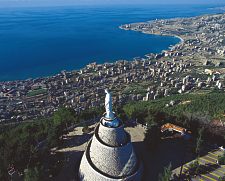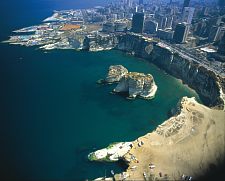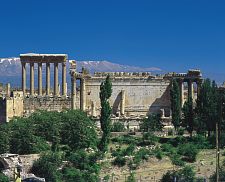|





| |
Iraq’s salvation lies in letting it break apart
The partition of Iraq into separate Kurdish, Sunni and Shi’ite
areas is the only route to peace, writes Peter Galbraith
Extract* Published in
The Sunday Times July 16, 2006
As horrific sectarian fighting unfolded early this year after the bombing of the
Askariya shrine in Samarra, I was staying in the Baghdad headquarters of
Kurdistan’s president, Massoud Barzani, putting the finishing touches to my book
on the future of Iraq.
Because of the headquarters’ central location in the fortified green zone,
Iraq’s leaders gathered there to discuss the crisis. It was clear they saw it as
a civil war.
As if to underline the point, three 9ft Katyusha rockets landed in close
proximity to Barzani’s house while I was writing. Fortunately, the closest one —
some 20 yards from me — was a dud.
The daily body count in Baghdad then was averaging 40, with many corpses found
with eyes gouged out, flesh drilled and other marks of beastly torture. By last
week it had risen to 60.
There is no good solution to the mess in Iraq. The country has broken up. The
United States cannot put it back together again and cannot stop the civil war.
The conventional wisdom holds that Iraq’s break-up would be destabilizing and
should be avoided at all costs. Looking at Iraq’s dismal history since Britain
cobbled it together from three Ottoman provinces at the end of the first world
war, it should be apparent that it is the effort to hold Iraq together that has
been destabilizing.
Pursuit of a coerced unity under Sunni-Arab domination — from the first
British-installed king to the end of the Saddam Hussein dictatorship in 2003 —
has led to endless violence, repression and genocide.
I do not believe it is possible in the long run to force people living in a
geographically defined area to remain part of a state against their will.
Certainly Iraq’s Kurds will never reconcile themselves to being part of Iraq.
Under these circumstances I believe that a managed amicable divorce is in the
best interests of the peoples of Iraq and will hasten American and British
withdrawal.
At the beginning of this year the Bush administration invested heavily in
diplomatic efforts aimed at forming a national unity government that included
the Shi’ites, Kurds, Sunni Arabs and secularists. It took until late April to
agree on a prime minister, president, two vice-presidents and the speaker of the
parliament. Because of its internal tensions, the government is not likely to
function very well. Even if it does, what will it govern?
Not Kurdistan: the regional government insists on its constitutional authority
to run its region. Baghdad ministries are not allowed to open offices there.
Not the Shi’ite south: it is run by a patchwork of municipal and governorate
officials who front for the clerics, religious parties and militias that are the
real power in the region.
Not the Sunni-Arab heartland: it is a battleground. The American military,
assisted by Shi’ite troops, are at war with insurgents and foreign terrorists.
Many Sunni Arabs despise both sides of this battle, but it does not mean that
they will accept the authority of a Shi’ite-led national government which they
see as installed by the Americans and aligned with Iran.
Not Baghdad, at least outside the green zone: Iraq’s capital is a city of armed
camps. Wealthy Iraqis maintain private armies for security. Although most of
Iraq’s ministries are outside the green zone, many ministers live inside it.
Most rarely go to their offices and spend their days visiting colleagues in the
zone. There is much talk at the highest levels of Iraq’s government — but little
government.
The situation should be blindingly obvious to the top US officials who visit.
After three years of occupation they cannot leave the green zone or even move
within the zone without a security detail the size of a small army.
Even when America and Britain had full legal authority in Iraq in 2003 and 2004,
they did nothing to arrest the break-up of the country.
In the south they allowed the Shi’ite clergy and religious parties to take power
and to build their Islamic states. While saying that Kurdistan should rejoin
Iraq, America did nothing to reduce any part of Kurdistan’s autonomy. While
outlawing armed forces that were not part of the Iraqi army, the coalition
allowed militias to proliferate.
If the coalition could not prevent Iraq’s unraveling when it was fully in charge
of the country, it is illogical now to put all the emphasis on building strong
national institutions, such as a single Iraqi army and powerful central
government, when American influence is much diminished.
How could a divorce be carried through? Arab Iraqi leaders have told me
privately that they accept Kurdistan’s right to self-determination. Some seem to
prefer that Kurdistan should leave, having grown weary of its refusal to make
any concessions to a shared state. With settled borders, the split between
Kurdistan and Arab Iraq could be more like Czechoslovakia’s velvet divorce than
Yugoslavia’s wars.
Turkey — with many Kurds living within its borders — has long been considered
the chief obstacle to Kurdish dreams for an independent state. Turkish attitudes
have evolved significantly, however. Some Turkish strategic thinkers, including
those within the so-called “deep state” comprising the military and intelligence
establishments, see a secular, pro-western and non-Arab Kurdistan as a buffer to
an Islamic Arab state to the south.
If the Shi’ite south forms a region, it can set up a theocratic government and
establish a regional guard. Iran will be the dominant power and the Bush
administration has no ability, and no intention, of countering Iran’s position
there.
These are not welcome developments but they need not be catastrophic. For the
United States and the world’s Shi’ites (including the Iranians) have a common
interest in defeating Al-Qaeda and its kindred Sunni fundamentalist movements.
Certainly Iraq’s Shi’ites would line up against the United States in the event
of an American confrontation with Iran. But America could have good relations
with a southern Iraqi Shi’ite theocracy that did not share the tortured US
relationship with Iran but came to power through a democratic process that
coalition troops made possible. And an elected regional government — with a
regional guard responsible to it — would certainly be preferable to the current
ad hoc system of informal Islamic rule enforced by sometimes competing militias.
Even a theocratic government can provide the political and economic stability
needed to permit new investment in the south’s vast oil reserves. By providing
technical assistance to a southern government, America and its coalition
partners may have some influence on internal developments.
The continued presence of American and British military forces in Iraq’s south
can only aggravate relations with the Shi’ite authorities without any
corresponding gain in what is a relatively secure part of Iraq. Last year
British troops clashed on several occasions with local police and militias. One
incident — where British forces attacked a police station to rescue two British
special forces troops who had been arrested while working undercover — nearly
escalated out of control.
As long as the coalition remains in the south there is a risk of more incidents.
Troops should be withdrawn in a rapid but orderly fashion.
What about the Sunni-Arab heartland? Here America faces a dilemma. The US
military presence among hostile Sunni Arabs seems to generate an endless supply
of new suicide bombers and insurgent fighters. If America withdraws from the
Sunni heartland, even more territory may fall into the hands of insurgents and
terrorists.
The pogroms after the destruction of the Askariya shrine served as a wake-up
call to many Sunni Arabs. In a Sunni-Shi’ite civil war, Sunni Arabs realize they
will lose. They may come to see the formation of a region as essential for
self-protection and therefore be less worried that federalism will lead to the
dissolution of Iraq.
If the Sunnis establish a regional guard, it could take over security
responsibilities from the Americans and the Shi’ite-dominated Iraqi army.
America could withdraw, making it clear that US forces would return only if the
regional authorities allowed Al-Qaeda and other anti-western terrorists to
operate freely from the region.
It will need to keep a force nearby, ready to intervene. Kurdistan is the ideal
location. It is close, the local population are friendly and it is at present
still in Iraq.
Even if the Sunni Arabs do not form a region, the United States should still
withdraw and leave security duties to the Iraqi army, which would presumably
continue to use Shi’ite forces there.
In sum: partition works as a political solution for Kurdistan, the Shi’ite south
and the Sunni Arab centre because it formalizes what has already taken place. By
contrast, the American effort to build a unified state with a non-sectarian,
non-ethnic police and army has not produced that result nor made much progress
towards it.
There is one remaining problem. Partition is a way to get most coalition forces
out of Iraq quickly. It does not solve the problem of Baghdad, however.
Theoretically, the United States has the power to provide some level of security
in Baghdad. This would require many more troops and result in many more
casualties. And it might not work. It is hard to imagine that there is any
support for this role in America.
The alternative is to recognize that there is not much that America is able and
willing to do to stop the bloodshed in Baghdad. Once they get started, modern
civil wars develop a momentum of their own. In Baghdad and other mixed Sunni-Shi’ite
areas, America cannot contribute to the solution because there is no solution,
at least not in the foreseeable future.
It is a tragedy and it is unsatisfying to admit that there is little that can be
done about it. But it is so. No purpose is served by a prolonged American
presence anywhere in Arab Iraq.
© Peter W Galbraith 2006
Extracted from The End of Iraq by Peter W Galbraith, published by Simon &
Schuster.
Peter Galbraith is a former US ambassador with a long involvement in policy on
Iraq
|